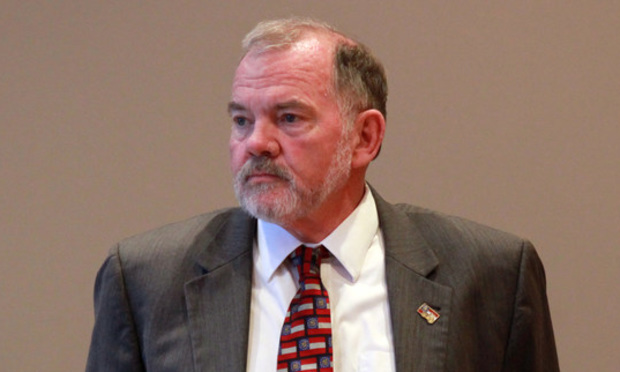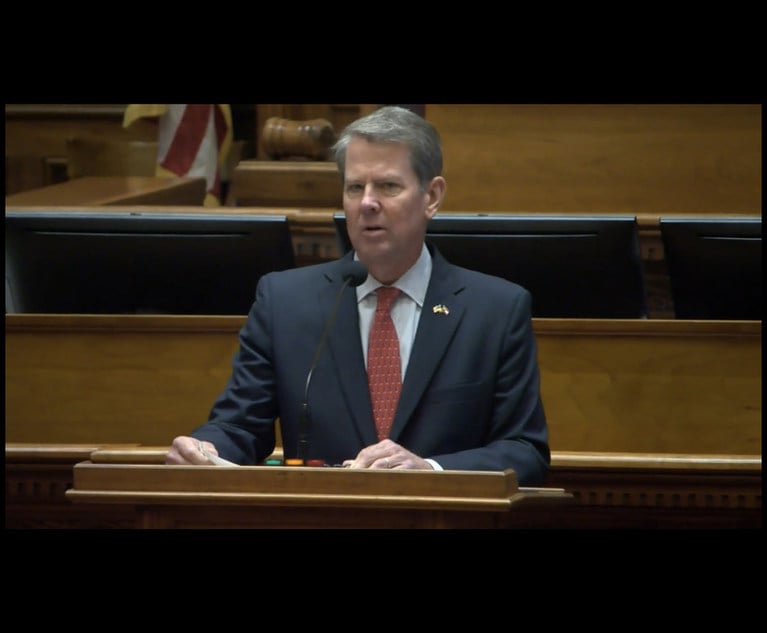Updated: Judicial Watchdog Recommends Removal of Judge Robert 'Mack' Crawford
“Deliberate choices were made then that now have consequences,” the panel said Thursday.
April 18, 2019 at 10:19 AM
7 minute read
 Judge Mack Crawford, Pike County Superior Court, at his Judicial Qualifications Commission hearing on Feb. 25. (Photo: John Disney/ALM)
Judge Mack Crawford, Pike County Superior Court, at his Judicial Qualifications Commission hearing on Feb. 25. (Photo: John Disney/ALM)
Georgia's judicial watchdog agency on Thursday recommended that a superior court judge accused of stealing funds from a county court registry be removed from the bench.
The Judicial Qualifications Commission's three-person hearing panel unanimously recommended the removal of Robert “Mack” Crawford—a superior court judge in the state's Griffin Circuit south of Atlanta. The panel in March held a two-day hearing over whether Crawford violated the state's Code of Judicial Conduct. The Georgia Supreme Court will make the final decision on the JQC recommendation.
The 10-member JQC has two parts: a seven-member investigative panel, which presents evidence to its three-member hearing panel.
The hearing panel said the hearing “demonstrated clearly and convincingly that Judge Crawford did not respect or comply with the law” when he directed a court clerk to give him a check for $15,675 belonging to his former clients. “Rather, he acted in contravention of the law when he took what was not plainly his and he did so in a manner that flouted another judge's order and the Uniform Rules of Superior Court,” the panel concluded.
The panel also pointed out that, at the time Crawford directed the clerk to transfer his clients' money in the registry to him, “Judge Crawford had a negative balance in his primary checking account and had accumulated over $300 in overdraft fees. He demanded $5,000 in cash when he presented the check at his bank and also paid several bills with the $10,000 that remained in his account. Finally, in early 2018, after Judge Crawford agreed to return the money to the Clerk, he had to borrow from his son in order to do so.”
Zebulon attorney Virgil Brown—who is representing Crawford together with former Georgia Gov. Roy Barnes—said that he has not seen the JQC report. But he said that Crawford will appeal the panel's recommendation to the state Supreme Court.
Brown said that Crawford also intends to appeal a decision by a Cobb County judge who rejected Crawford's challenge claiming that JQC members were not lawfully appointed by the state Senate.
Brown added that Crawford had a pending claim for the money—which he has said he laid claim to as unpaid legal fees—in Pike County probate court. “If it turns out it's [Crawford's] money, it's pretty hard to say they [the hearing panel members] are correct,” he said.
Barnes said he was disappointed in the recommendation and that Crawford had never issued an order to the clerk to deliver the funds to him. “I look forward to arguing the matter before the [state] Supreme Court,” he said.
The JQC suspended Crawford last year after a Pike County grand jury indicted him on charges of felony theft and violating his oath of office. Crawford was indicted after the JQC filed ethics charges against the judge last year.
Crawford is accused of directing a court clerk to write him a check for the more than $15,000 in unclaimed funds belonging to Crawford's former clients that been in the court registry since 2002.
Crawford has pleaded not guilty to the criminal charges and testified at his hearing that the funds were owed to him as legal fees.
Crawford, who was appointed to the bench by then-Gov. Sonny Perdue in 2010, previously served as executive director of the Georgia Public Defender Council from 2007 to 2010. He was in private practice from 1987 to 2007 and served as a state legislator.
The JQC hearing panel includes Fulton County Superior Court Chief Judge Robert McBurney, Jamala McFadden of Atlanta's McFadden Davis and Cobb County Police Chief Michael Register.
In recommending Crawford's removal, the panel rejected the judge's testimony at his ethics hearing that he had made a mistake.
The panel determined the steps Crawford took “to misdirect his clients' money … reflect conscious, consistent decisions to act in a manner inconsistent with the norms of our judiciary.” Those steps included Crawford's conversation with the court clerk that the funds should be turned over to him, Crawford's drafting of a handwritten note that the panel said “authorized the transfer but was kept from the public's eye” and Crawford's decision to immediately spend about a third of the funds taken, the panel said.
“Deliberate choices were made then that now have consequences,” the panel concluded. “While $15,000 is not a large sum, the amount is immaterial. It is the nature of the offense that is aggravating, as it calls into question the honesty and integrity of someone whose honesty and integrity must be beyond reproach for him to be effective in the role with which the public has entrusted him.”
The panel also discounted Crawford's claim that the money had been promised to him by former client Dan Mike Clark as legal fees, even though Crawford allowed the funds to remain unclaimed in the court registry for 15 years.
Crawford filed the case on behalf of Clark and Clark's companion, Bobbie Whalen, in 2002 to redeem the property where the couple lived that had been sold by the county to pay unpaid property taxes.
Crawford did not advance the funds deposited into the registry to his clients, according to court testimony and the JQC.
Clark died in 2004, and Whalen subsequently left the state. The case was dismissed in 2009, and Superior Court Judge Tommy Hankinson directed that the registry funds be returned to Clark and Whalen.
When the case was dismissed, “Judge Crawford did not seek any of the funds for himself, even though his work was complete and his unwritten invoices due,” the JQC panel said. “Instead, he assisted the Clerk of Court with her efforts in tracking down Whalen, Clark, and Clark's heirs so the money could go to them.”
“Nor did Judge Crawford take any step to lay claim to the money for the following eight years,” the panel said. “Indeed, it was only in December 2017, more than fifteen years after Clark and Whalen's money had been placed in the registry, that Judge Crawford, now in the midst of financial difficulties, suddenly declared the money to be his.”
The hearing panel's report called Crawford's decision to lay claim to the money a “remarkable volte-face … supported only by Judge Crawford's uncorroborated—and unpersuasive—claim that Dan Mike Clark once told him, when the pair was alone, that Judge Crawford could keep whatever money was left in the registry if Clark could just stay on the land.”
“Nothing in the record outside of Judge Crawford's say-so supports this allegation and the panel does not credit it,” the report said. “Judge Crawford never memorialized such an understanding about what would happen with the money in the registry if Clark were able to remain on the land … . Nor did he ever send a bill for services rendered to either Whalen or Clark.”
The JQC said that Crawford also never provided the hearing panel with any billing records to support a claim of nearly 80 hours of work “on a case in which he filed a simple complaint, engaged in no discovery, and participated in no substantive hearings.”
When pressed by agents with the Georgia Bureau of Investigation and members of the JQC panel while testifying at his ethics hearing, Crawford “ was unable to articulate any particular amount owed by Clark and Whalen for the value of his legal services,” the report concluded.
This content has been archived. It is available through our partners, LexisNexis® and Bloomberg Law.
To view this content, please continue to their sites.
Not a Lexis Subscriber?
Subscribe Now
Not a Bloomberg Law Subscriber?
Subscribe Now
NOT FOR REPRINT
© 2025 ALM Global, LLC, All Rights Reserved. Request academic re-use from www.copyright.com. All other uses, submit a request to [email protected]. For more information visit Asset & Logo Licensing.
You Might Like
View All
Panel to Decide if Governor Should Suspend Georgia Lawyer From Elected Post
4 minute read

Plaintiffs Attorneys Awarded $113K on $1 Judgment in Noise Ordinance Dispute
4 minute readTrending Stories
- 1Gunderson Dettmer Opens Atlanta Office With 3 Partners From Morris Manning
- 2Decision of the Day: Court Holds Accident with Post Driver Was 'Bizarre Occurrence,' Dismisses Action Brought Under Labor Law §240
- 3Judge Recommends Disbarment for Attorney Who Plotted to Hack Judge's Email, Phone
- 4Two Wilkinson Stekloff Associates Among Victims of DC Plane Crash
- 5Two More Victims Alleged in New Sean Combs Sex Trafficking Indictment
Who Got The Work
J. Brugh Lower of Gibbons has entered an appearance for industrial equipment supplier Devco Corporation in a pending trademark infringement lawsuit. The suit, accusing the defendant of selling knock-off Graco products, was filed Dec. 18 in New Jersey District Court by Rivkin Radler on behalf of Graco Inc. and Graco Minnesota. The case, assigned to U.S. District Judge Zahid N. Quraishi, is 3:24-cv-11294, Graco Inc. et al v. Devco Corporation.
Who Got The Work
Rebecca Maller-Stein and Kent A. Yalowitz of Arnold & Porter Kaye Scholer have entered their appearances for Hanaco Venture Capital and its executives, Lior Prosor and David Frankel, in a pending securities lawsuit. The action, filed on Dec. 24 in New York Southern District Court by Zell, Aron & Co. on behalf of Goldeneye Advisors, accuses the defendants of negligently and fraudulently managing the plaintiff's $1 million investment. The case, assigned to U.S. District Judge Vernon S. Broderick, is 1:24-cv-09918, Goldeneye Advisors, LLC v. Hanaco Venture Capital, Ltd. et al.
Who Got The Work
Attorneys from A&O Shearman has stepped in as defense counsel for Toronto-Dominion Bank and other defendants in a pending securities class action. The suit, filed Dec. 11 in New York Southern District Court by Bleichmar Fonti & Auld, accuses the defendants of concealing the bank's 'pervasive' deficiencies in regards to its compliance with the Bank Secrecy Act and the quality of its anti-money laundering controls. The case, assigned to U.S. District Judge Arun Subramanian, is 1:24-cv-09445, Gonzalez v. The Toronto-Dominion Bank et al.
Who Got The Work
Crown Castle International, a Pennsylvania company providing shared communications infrastructure, has turned to Luke D. Wolf of Gordon Rees Scully Mansukhani to fend off a pending breach-of-contract lawsuit. The court action, filed Nov. 25 in Michigan Eastern District Court by Hooper Hathaway PC on behalf of The Town Residences LLC, accuses Crown Castle of failing to transfer approximately $30,000 in utility payments from T-Mobile in breach of a roof-top lease and assignment agreement. The case, assigned to U.S. District Judge Susan K. Declercq, is 2:24-cv-13131, The Town Residences LLC v. T-Mobile US, Inc. et al.
Who Got The Work
Wilfred P. Coronato and Daniel M. Schwartz of McCarter & English have stepped in as defense counsel to Electrolux Home Products Inc. in a pending product liability lawsuit. The court action, filed Nov. 26 in New York Eastern District Court by Poulos Lopiccolo PC and Nagel Rice LLP on behalf of David Stern, alleges that the defendant's refrigerators’ drawers and shelving repeatedly break and fall apart within months after purchase. The case, assigned to U.S. District Judge Joan M. Azrack, is 2:24-cv-08204, Stern v. Electrolux Home Products, Inc.
Featured Firms
Law Offices of Gary Martin Hays & Associates, P.C.
(470) 294-1674
Law Offices of Mark E. Salomone
(857) 444-6468
Smith & Hassler
(713) 739-1250







